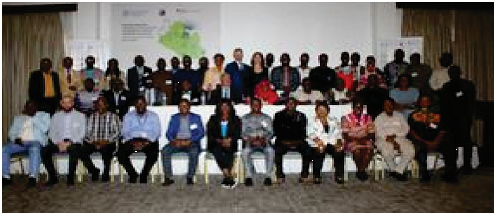By Precious D. Freeman
The Food and Agriculture Organization (FAO) Representative to Liberia, Mariatou Njie, says it has been estimated that about 38.9 percent of Liberia’s population is undernourished.
She added that the World Bank estimated that poverty has increased substantially at a rate rising to 52 percent.
She made the remarks at an FAO event, called “Boosting responsible investment in agriculture and food systems in Liberia for sustainable development with focus on results and lessons learned are ways forward for rolling out responsible agriculture investment screening in Liberia.”
According to her, the event is organized at a very timely moment when years of progress made to reduce poverty and hunger have been jeopardized by the COVID-19 pandemic.
Madam Njie stated further that due to the pandemic, many workers particularly young women and men working in the agriculture sector lost their jobs and farmers incurred considerable income losses.
“FAO is committed to contribute to a more equitable, resilient, and performing post COVID-19 economic growth enabled by an enhanced investment screening process that will facilitate more responsible investment in the agriculture sector of Liberia, and this will make the private sector more viable to lead the much-anticipated growth” she said.
She maintained that in Liberia, building back better requires more responsible investments in agriculture and food systems, which are the principal sources of income and employment.
The FAO Representative to Liberia further stated that investment does not occur in a vacuum, it requires a strong enabling environment that sets the scene by providing clear rules, processes, and mandates for good of all the actors.
“Whilst governments have the primary responsibility to provide such enabling environments through the development or reform of policies and laws, and provisions of incentives that promote, facilitate, and regulate investments, FAO encourages private actors to ensure that they make their investments more responsive, responsible and sustainable to the people, planet, and their profits” she said.
She however maintained that one of the many critical roles government have in the context of agriculture investment is that of a gatekeeper, and that government can decide which investors are allowed to conduct business in their country and what types of investments are permitted.
Speaking further, the German Ambassador to Liberia Jakob Haselhuber added that stimulating and increasing responsible investment in agriculture and food systems is critical to achieve the SDGs, where the agri-food sectors have been identified by the United Nations Conference on Trade and Development as one of the 10 priority sectors for financing.
He added that it is critical to stimulate investments that will effectively contribute to the eradication of poverty and hunger by creating decent jobs and conserving the environment.
“I am glad that this support has resulted in practical and actionable policy proposal such as the revision of the investment and investors screening policy which are both in critical to maximize opportunities and to maximize risk of investment” he said.


